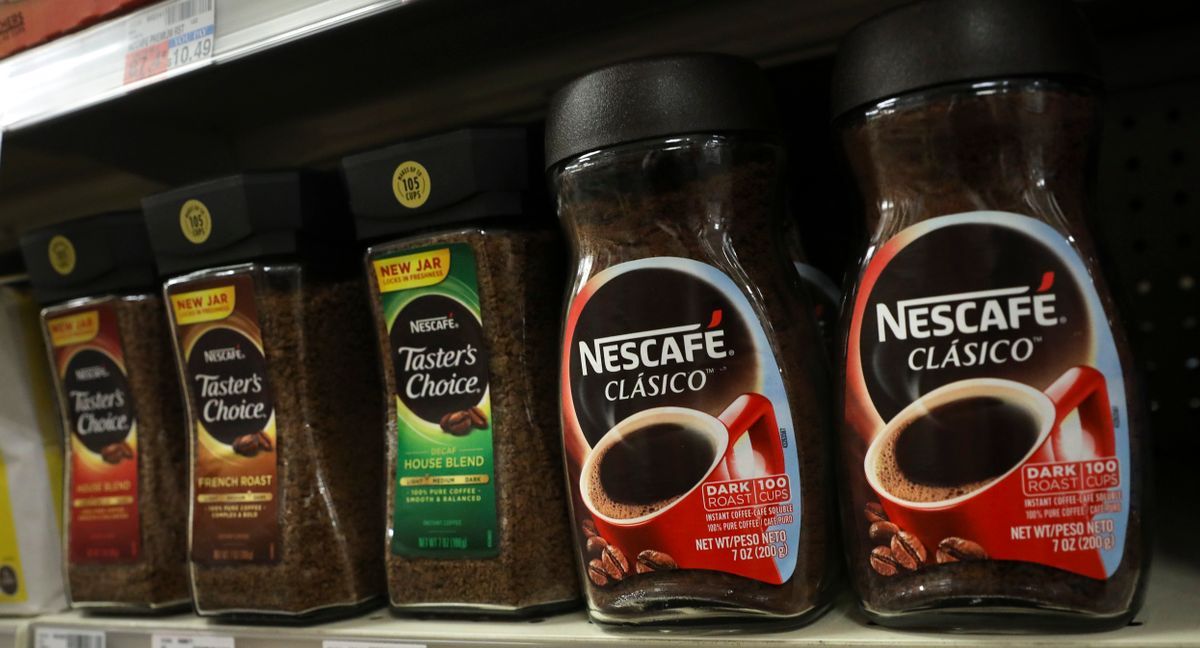Nestl' commits more than $1B to coffee sustainability amid climate change concerns

Dive Brief:
- Nescafe, Nestlé's largest coffee brand, plans to spend more than $1 billion to help the food and beverage giant source coffee more sustainably.
- Nestlé, which previously vowed to source all its coffee sustainably by 2025, also plans to get 20% of its coffee sourced from regenerative agricultural methods by 2025. Half will be sourced that way by 2030.
- Studies have shown that rising temperatures, diseases and drought will reduce the amount of land that can be used to grow coffee by up to 50%, while impacting the taste and aroma of the beverage.
Dive Brief:
- Nescafe, Nestlé's largest coffee brand, plans to spend more than $1 billion to help the food and beverage giant source coffee more sustainably.
- Nestlé, which previously vowed to source all its coffee sustainably by 2025, also plans to get 20% of its coffee sourced from regenerative agricultural methods by 2025. Half will be sourced that way by 2030.
- Studies have shown that rising temperatures, diseases and drought will reduce the amount of land that can be used to grow coffee by up to 50%, while impacting the taste and aroma of the beverage.
Dive Insight:
Nestlé’s popular Nescafé is the latest brand to commit big money to improve sustainability and ensure future availability for a commodity important for one of its biggest products.
The Switzerland-based company said it will work with farmers on regenerative agriculture practices, including planting cover crops to protect soil, incorporating organic fertilizers to improve soil fertility and pruning existing coffee trees or replacing them with disease and climate-change-resistant varieties.
In a statement, Nescafé said it is “committed to supporting farmers who take on the risks and costs associated with the move to regenerative agriculture,” and “will provide programs that aim to help farmers improve their income as a result of that transition.”
“Climate change is putting coffee-growing areas under pressure," David Rennie, head of Nestlé Coffee Brands, said in a statement. "We're accelerating our work to help tackle climate change and address social and economic challenges in the Nescafé value chains.”
A report issued last year found that 15 of the major coffee traders and roasters are not meaningfully contributing to key environmental and social challenges identified by the United Nations that would improve the livelihoods of coffee farmers and conserve nature. It added that some of the world’s largest coffee companies are not being transparent about their progress or clear about their commitments.
The coffee segment is worth between $200 billion to $250 billion annually at the retail level, the report estimated, but coffee-producing countries and their producers get less than 10% of that total.
For companies like Nestlé that depend on coffee, lowering the environmental impact of the crop and helping producers who grow it is a smart and necessary decision. Money spent now could prove to be a shrewd and worthwhile investment in the future, especially with coffee becoming more popular.
Nestlé’s popular Nescafé is the latest brand to commit big money to improve sustainability and ensure future availability for a commodity important for one of its biggest products.
The Switzerland-based company said it will work with farmers on regenerative agriculture practices, including planting cover crops to protect soil, incorporating organic fertilizers to improve soil fertility and pruning existing coffee trees or replacing them with disease and climate-change-resistant varieties.
In a statement, Nescafé said it is “committed to supporting farmers who take on the risks and costs associated with the move to regenerative agriculture,” and “will provide programs that aim to help farmers improve their income as a result of that transition.”
“Climate change is putting coffee-growing areas under pressure," David Rennie, head of Nestlé Coffee Brands, said in a statement. "We're accelerating our work to help tackle climate change and address social and economic challenges in the Nescafé value chains.”
A report issued last year found that 15 of the major coffee traders and roasters are not meaningfully contributing to key environmental and social challenges identified by the United Nations that would improve the livelihoods of coffee farmers and conserve nature. It added that some of the world’s largest coffee companies are not being transparent about their progress or clear about their commitments.
The coffee segment is worth between $200 billion to $250 billion annually at the retail level, the report estimated, but coffee-producing countries and their producers get less than 10% of that total.
For companies like Nestlé that depend on coffee, lowering the environmental impact of the crop and helping producers who grow it is a smart and necessary decision. Money spent now could prove to be a shrewd and worthwhile investment in the future, especially with coffee becoming more popular.
)
)
)
)
)
)
)
)
)
)
)
)
)
)
)
)
)
)
)
)
)
)
)
)
)
)
)
)
)
